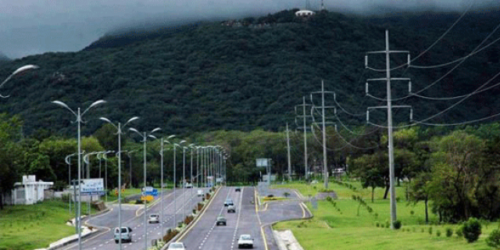Pakistan Environmental Protection Agency (Pak-EPA) Director General Farzana Altaf Shah on Monday told the Senate Standing Committee on Climate Change that the air pollutant ratio in the federal capital was calculated below permissible limits of National Environmental Quality Standards (NEQS) since January. The committee meeting was chaired by Senator Muhammad Hamayun Mohmand.
She apprised the forum that the most hazardous pollutant of particulate matter (PM2.5) was recorded at 17.5 microgrammes per cubic metre which is far below the NEQS of 35 microgrammes per cubic meter. She added that there were two main sources of pollution in the federal capital, industrial sector emissions and waste burning.
“There are eight steel furnaces in the industrial area of Sector I-9 that has installed dry scrubbers to reduce dark smoke,” she stated. The EPA DG further informed that Aabpara, Mandi Mor and Motorway interchange were identified as hotspots where 30-40 trucks or heavy vehicles were challaned daily on higher emissions.
She underlined that during the Covid-19 lockdown, the air quality was recorded healthy. With Rs46 million budget, Pak EPA was ensuring all its equipment operational 24/7 whereas, under its first project of Pollution Lower Assessment Network, four new and one existing monitoring station would be established, she maintained.
“Under this, we will be working on water shortage data in the federal capital to assess the future needs of the metropolis,” she added.
Senator Mushahid Hussain Sayed suggested the EPA develop its smart application for providing real-time air quality index (AQI) of the federal capital.
Speaking on the occasion, Minister of State for Climate Change Zartaj Gul said the government had implemented plastic bags ban through standing committees of the Parliament at the federal level which would be followed in every environmental conservation endeavour.
She further informed that more than 4,000 brick kilns in Punjab have been converted to Zig Zag technology to curb air pollution while steps were being taken to move kilns in Islamabad on the same technology. She said that so far, seven kilns in Islamabad have been converted to modern technology.
Moreover, Senator Taj Haider said that disordered traffic needs to be stopped to reduce air pollution because it causes more pollution.
While considering the Global Change Impact Studies Center Amendment Bill presented in the meeting, Senator Sherry Rehman objected that Parliament is not represented in the Board of Governors (BoG) of the centre. She said that if they are not represented on the board, the Parliament will lose its oversight.
The secretary for Climate Change informed that the Ministry of Law thought that parliamentarians should not be represented in the executive board to which Rehman replied that if this is the case then what will happen to all other members of the board as they have fought and included parliamentarians in China-Pakistan Economic Corridor (CPEC) and other boards.
At the meeting, the committee members unanimously decided to make further amendments to the bill through which the board shall represent one member of both houses and a board meeting shall be convened every three months.
The members of the committee also recommended that the anti-litigation bill introduced by Senator Faisal Javed and approved by the Senate be introduced in the National Assembly soon.





